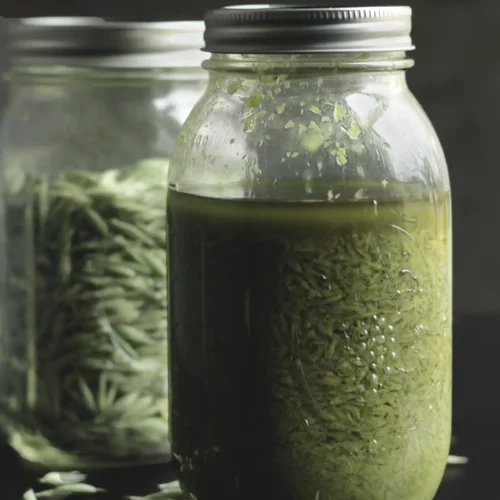
Milky Oat Tincture
Milky oat tincture can help with stress, anxiety, exhaustion, and overall resilience.
Equipment
- Sterilized glass jar with a tight-fitting lid
- Cheesecloth or a fine-mesh strainer
- Funnel
- Amber glass dropper bottle
Ingredients
- 1 part fresh milky oat tops
- 2 parts high-proof alcohol such as vodka or grain alcohol
Instructions
- Harvest fresh milky oats at the “milky” stage. The window for this stage is short and only lasts a few days. Check your oat tops daily to know when to harvest.
- Sterilize your mason jar and make sure it’s completely dry before adding the ingredients. Blend the milky oats and alcohol in a very clean blender to help release the milky substance. Add the mixture to the sterilized jar. Make sure the oats are covered completely. Top off with a little more alcohol, as needed. The ratio of alcohol to milky oats should be roughly 2:1 (for example, 2 cups alcohol to 1 cup oats).
- Place the jar in a cool, dark place and let it sit for about 4-6 weeks. Shake the jar once a day to mix everything around.
- After four to six weeks, strain the tincture using a cheesecloth and a fine-mesh strainer. Squeeze the oats in the cheesecloth to extract all of the liquid. Use a funnel to transfer the tincture into amber glass dropper bottles. The amber glass will protect the tincture from light and help to preserve its potency.
- Label the tincture with the date and the name of the herb. Store it in a cool, dark place. A tincture can last for several years if stored properly.
Notes
It’s always best to consult with a qualified healthcare practitioner or herbalist who can help you determine the appropriate dosage based on your individual needs. However, here are some general guidelines for adults using a milky oat tincture:
Gentle Nervine Tonic: 1–2 droppers full (approximately 30–60 drops), taken 1–3 times daily as needed. You can start with a smaller amount, around 10–15 drops, once or twice a day to see how your body responds, especially if you’re new to using herbs.
Use consistently to help build resilience over time, as the gentle, nourishing effects compound with regular use.
Note: This information is general and for educational purposes only. Your personal health and dosing should be determined by you and your healthcare provider.
Milky oats are generally considered safe for most people when consumed in reasonable amounts, but there are a few things to keep in mind:
-
- Celiac Disease: Oats are gluten-free but contain avenin, a protein that can cause reactions in some people with severe gluten sensitivities.
-
- Allergies: Although rare, some people may have an allergy to oats. Symptoms may include skin reactions, digestive upset, or respiratory issues like sneezing or a runny nose. Avoid milky oats if you know you have an oat allergy or are sensitive to oat-based products.